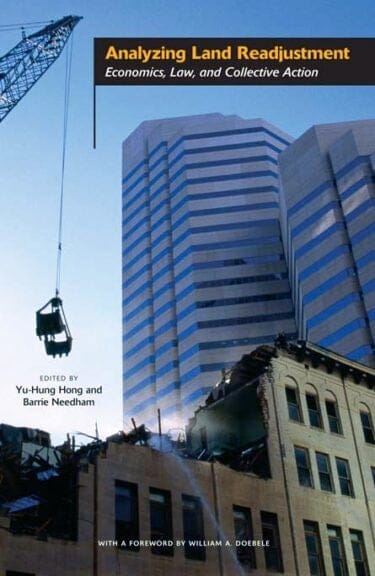Livros

Analyzing Land Readjustment
Economics, Law and Collective Action
Edited by Yu-Hung Hong and Barrie Needham
Abril 2007, inglês
Lincoln Institute of Land Policy
Great effort has been devoted to the precise delineation and assignment of the legal and physical boundaries of private property. Yet, issues of unifying or assembling private property rights for urban redevelopment remain understudied. Edited by Yu-Hung Hong and Barrie Needham, the chapters in this book describe a viable alternative to voluntary exchange or public intervention in the form of expropriation: land readjustment. The authors explore the international possibilities for facilitating cooperative land readjustment and the circumstances under which this should be possible.
The difficulty of assembling land has long been considered by public and private developers a major impediment to land redevelopment, especially in urban centers where property ownerships are segmented. Conventional land-assembly methods, most noticeably voluntary exchange and eminent domain, have at best produced “suboptimal” outcomes (in terms of efficiency and equity) and at worst thwarted urban revitalization initiatives.
In this book, the authors argue that there may be a third way, termed instigated property exchange—a concept applied in a land-assembly method commonly known in the literature as land readjustment. The intention of creating this term is to broaden the scope of the analysis to include innovative land-assembly methods that are similar to land readjustment, but do not follow exactly its conventional structure. As long as selected land-assembly schemes involve land-for-land (or property rights) exchanges, the editors comprise them in their analysis and in the case studies of countries where these tools have been applied. These studies include land readjustment experiences in Germany, Japan, The Netherlands, and Israel, and also explore the potential for urban redevelopment in China and the United States.
This book is dedicated to William A. Doebele, professor of planning and urban design emeritus of Harvard University Graduate School of Design, who introduced the concept of land readjustment to American scholars and practitioners more than 25 years ago. Since then, he has been researching industriously the transferability of the technique to the United States and other countries. Doebele notes in his foreword to the book:
“Training in the basic principles of land readjustment should be part of the education of every city planner, real estate development professional, and other individuals engaged in making policy for land and urban development. . . . As a text and reference, this volume will contribute to more informed and wider applications of land readjustment in complex situations that require solutions more efficient and equitable than those provided by any other instrument now available.”
About the Editors
Yu-Hung Hong was a fellow at the Lincoln Institute of Land Policy.
Barrie Needham is a professor at the University of Nijmegen in The Netherlands.
Table of Contents
I. Introduction
1. Assembling Land for Urban Development: Issues and Opportunities, Yu-Hung Hong
II. Legal Issues
2. Mandatory Happiness? Land Readjustment and Property in Germany, Benjamin Davy
3. More than Land Assembly: Land Readjustment for the Supply of Urban Public Services, Rachelle Alterman
III. Social and Cultural Issues
4. Consensus, Persuasion, and Opposition: Organizing Land Readjustment in Japan, André Sorensen
5. The Search for Greater Efficiency: Land Readjustment in The Netherlands, Barrie Needham
IV. Experiments
6. New Experiments to Solve Urban Renewal Problems in China, Ling Hin Li and Xin Li
7. Land Assembly, Land Readjustment, and Public/Private Redevelopment, Lynne B. Sagalyn
V. Summary
8. Law, Reciprocity, and Economic Incentives, Yu-Hung Hong
Keywords
Avaliação, Estimativa, Lei de Uso do Solo, Monitoramento do Mercado Fundiário, Regulação dos Mercados Fundiários, Monitoramento Fundiário, Uso do Solo, Planejamento de Uso do Solo, Valor da Terra, Temas Legais, Regimes Regulatórios, Recuperação de Mais-Valias
